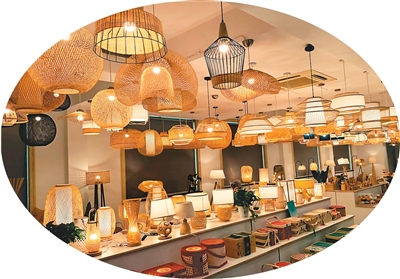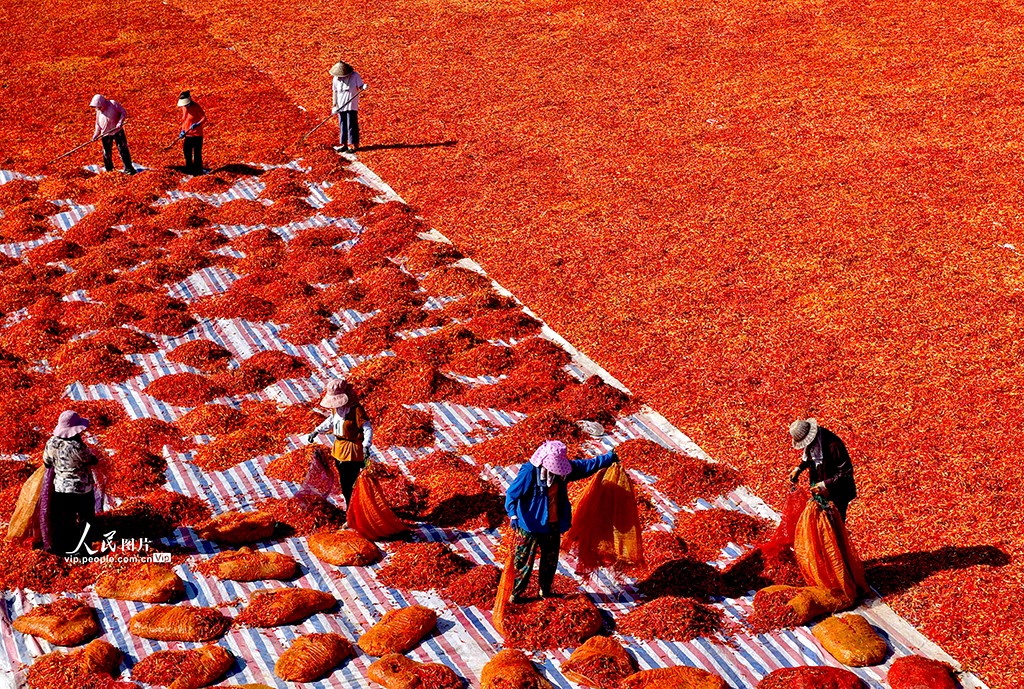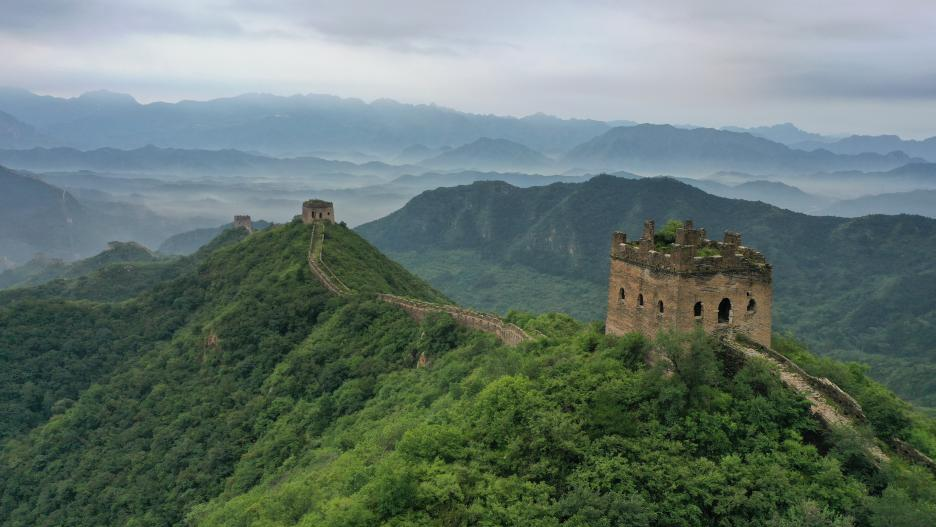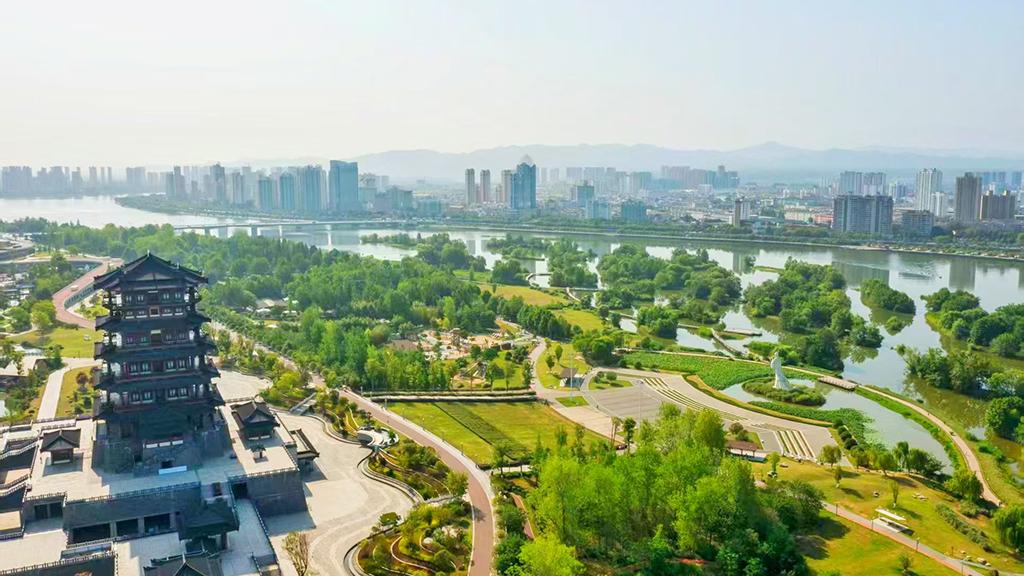Bamboo industry flourishes in Anji, E China's Zhejiang

Photo shows bamboo forests in Anji county, Huzhou city, east China's Zhejiang Province. (Photo/Kang Fengying)
With 1.08 million mu (72,000 hectares) of bamboo forests, the bamboo industry in Anji county, Huzhou city, east China's Zhejiang Province has flourished. Today, the people of Anji are injecting new vitality into the industry with innovation, creativity, and craftsmanship.
Recently, more than 30 experts and government officials from the International Bamboo and Rattan Organization (INBAR), as well as from countries such as Nepal and Indonesia, visited Zhejiang Zhuguan Ecological Technology Co., Ltd. to learn about its case of brewing liquor from bamboo shoots.
According to Nie Zhongping, chairman of the company, bamboo shoots are harvested around late April when rainfall is plentiful and growth is at its peak. After chopping, they undergo an initial fermentation. Fresh shoots are added twice in a 1:1 ratio at set intervals. In total, five fermentation rounds are carried out over one year. Each round produces a base liquor with a distinct character, which is then blended into the finished bamboo liquor. It takes 10 kilograms of bamboo shoots to make just 0.5 kilograms of liquor.
The fermentation residue is fully reused to produce decorative furniture boards. Tests by the China National Bamboo Research Center show that these boards are formaldehyde-free, mold-resistant, lightweight, and strong, using only half the usual adhesive while achieving 60 percent greater strength.
Yu Wenji, an academician of the International Academy of Wood Science and chief expert at the Chinese Academy of Forestry, said Zhejiang Zhuguan Ecological Technology Co., Ltd. has made a breakthrough by using an all-bamboo shoot process and proprietary technology to produce liquor with no additives, no pollution, and no grain. This represents a milestone in the global bamboo industry—using bamboo in place of grain.

Photo shows bamboo lamps produced by Zhejiang Fenghui Bamboo and Wood Co., Ltd. (Photo/Chen Maoying)
Zhang Mingzhong, born in 1969, went to work at a local paper mill after graduating from technical secondary school, but when the factory shut down, he had to strike out on his own.
Bamboo has long been a traditional industry in Anji. At the time, bamboo filament factories were everywhere, and the bamboo scraps and offcuts they produced posed a disposal problem. Seeing a business opportunity, Zhang set up a company to collect the waste and turn it into biomass fuel pellets—known locally as "fuel sticks." They became a popular export product for a time, but when Anji later phased out the bamboo filament factories, making fuel sticks was no longer viable.
Zhang then founded Zhejiang Yaozhu Technology Co., Ltd. Drawing on his paper mill experience, he began exploring ways to separate cellulose, hemicellulose, and lignin from bamboo using physical methods. For someone with only a technical school education, this meant years of self-study as well as the need for significant financial support.
In 2021, Zhang's innovation on an eco-friendly bamboo fiber extraction method and system was granted an invention patent by the China National Intellectual Property Administration. With expert appraisal of the technology, he secured financing and solved the funding challenge.
Although Zhang had solved the problem at the extraction stage, another hurdle remained: the bamboo first had to be shaved into paper-thin sheets. Manual processing was slow, labor-intensive, and inconsistent, and the initial filamenting step was another major obstacle. Resourceful as ever, Zhang obtained a patent in 2022 for a shaving device, followed in 2023 by another for a secondary bamboo fiber filamenting device.

Photo shows a building decorated with bamboo at Zhejiang Zhujing Culture and Tourism Development Co., Ltd. in Anji county, Huzhou city, east China's Zhejiang Province. (Photo/Chen Maoying)
With his machines integrated, a fully automated bamboo-to-fiber production line was piloted last year. After adjustments, it achieved stable mass production this year, producing 30 tonnes of bamboo fiber daily.
"From 2.5 tonnes of bamboo, we can extract 1 tonne of fiber," Zhang explained. "The production cost is only 1,500 yuan ($208.80) per tonne, while the market price is 6,000 yuan. Demand far exceeds supply."
The derived products add even more value: bamboo fiber fabric for socks sells at 18,000 yuan per tonne, for clothing at 120,000 yuan, and for medical masks at 200,000 yuan. Water is recycled in the process, with no wastewater generated, and every part of the bamboo is fully utilized.
Zhejiang Banzhu Stationery Co., Ltd. has developed bamboo pencils as a substitute for wood. Working with research institutes to tackle technical challenges, the company launched its first bamboo pencil in May this year, and the products were immediately snapped up by a Japanese buyer.
The waste from bamboo pencil production is used as raw material by Anji Zhudi New Materials Technology Co., Ltd., located just one floor below. In this industrial park, the floors form an upstream-downstream chain, making circular production the standard in Anji.
Photos
Related Stories
- Selling bamboo to the world: A green industry rises in E China's Jiangxi
- C China's Zhengzhou: One-click global trade drives cross-border e-commerce development
- Chinese town taps bamboo to fuel eco-friendly manufacturing
- Bamboo shoot harvest underway in SW China's Yunnan
- Feature: Bamboo material flourishes with profits, innovation, low carbon footprint
- China pushes for bamboo to replace plastics
- Replacing plastic with bamboo to turn green into "gold" in E China's Jiangxi
- Bamboo carver inherits traditional carving arts in E China's Anhui
- Trending in China | Autumn bamboo shoots
- China, EU, Africa seek green cooperation using bamboo instead of plastic
Copyright © 2025 People's Daily Online. All Rights Reserved.









